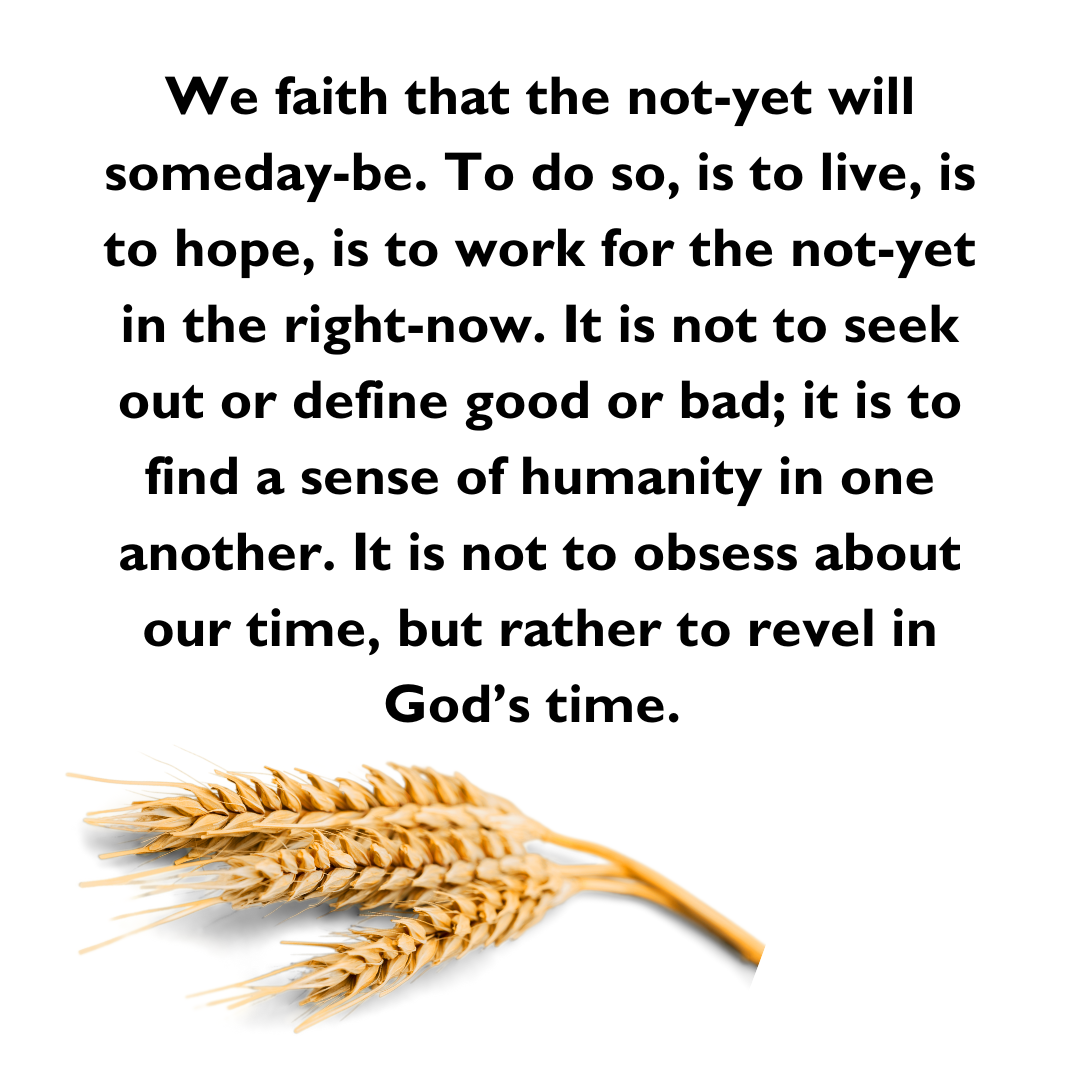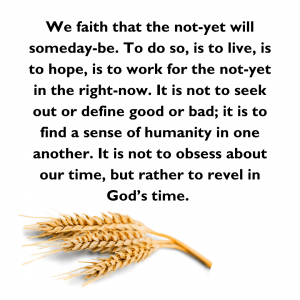Weeds in my Wheat

Weeds in my Wheat
Bob Stillerman
8th Sunday After Pentecost, 7/23/2023
Matthew 13:24-30; 36-43
Weeds in my Wheat Matthew 13.24-43 7-23-2023
The parables of Jesus sure do illustrate the complexities of life. They remind us, that, try as we may, we will never reduce the economy of God into a series of precise answers. Our world contains the duality of good and evil, and we must navigate this reality with a balance of pragmatism, compassion, and creativity.
Jesus tells a fable. There is a householder, a wealthy Lord if you will. And the householder’s household sows the fields with wheat seeds, hoping to return a bountiful harvest. This person, this householder, has given me, the reader/hearer, no reason for offense. I’d like to root for their success – after all, Cheerios are essential to the wellbeing of the Stillerman household, and a good wheat harvest is good for the whole community. Right?
And yet this person, the householder, helps to perpetuate a vastly unjust system. They own slaves. They have massive amounts of wealth and land. Their autonomy, no matter how well demonstrated within the vassal system, is still unjust. I am reminded of the hit TV show, The Sopranos. An entire nation watched its anti-hero, Anthony Soprano, a vicious New Jersey Mafia Boss, for the better part of a decade. We knew exactly who he was; we knew the atrocities he committed and perpetuated. And yet we also knew his charisma and his vulnerabilities. And we found ourselves hoping that he’d be okay, that he’d navigate the system, that he’d find some sense of peace and resolution in his life. We learned that there is humanity, even in the evil ones.
It turns out our householder has enemies. In the cover of darkness, a rival plants weeds among the new seeds. But here’s what’s maniacal about this deed.
John T. Carroll reminds us that those weeds are most likely called zizania. And when they reach maturity, they look nearly identical to wheat. Not only do the weeds threaten to choke out the wheat, but they are nearly indistinguishable for the farmer. The pettiness of the deed rivals its cruelty.
As a hearer, I’m not just irritated by the deed, but I am also irritated by the participants. Each rival possesses an amount of wealth that could never be disposed of. And yet they fight for more. Billionaires fighting to carve out one more dollar. Our householder has been wronged, and it’s fair to consider how they might be made whole. But we cannot consider such things, if we do not also consider how the householder might make whole the many others they have wronged.
I hope, you, as a hearers, will not miss the irony of slaves, servants, and subordinates asking how they might protect the wealth of their householder, a wealth built at their expense.
We know a little something of good and evil. How about of urgency and patience as well?
If I were an effective gardener, I would opt for urgency. Pluck those weeds at once! Don’t let them take root. Action is imperative! (Side note: I am not an effective gardener. Our lettuce bolted in May, and we didn’t know until last week! And the weeds have a happy habitat throughout our little estate). But in this story, one would believe that urgency is the proper course. And the workers are ready to be swift, precise, and determined.
But strangely, the householder urges patience. There’s time. Let them grow together, and when the harvest comes, we will separate them out. The wheat will go to the threshing floor. The weeds, we’ll gather in bundles, and eventually, we’ll use the bundles as fuel for our fires.
We live in systems that precondition us to determine what is precisely good and what is precisely bad. And we live in systems that precondition us to adhere to swift schedules – time is money!
In this parable, Jesus is telling us, in a not-so-subtle way, that the economy of God, that inbreaking kinship, will not be beholden to unjust systems. God’s not trying to carve out more, God’s working to provide enough. For everyone. God’s not firing the starter gun on a foot race, God’s inviting us into our own pace. God does not shoehorn goodness into a templated package; God does not write out meticulous schedules; God is seeking to draw out the humanity and goodness in all of Creation.
This parable finds its home in Matthew’s Gospel. And that means we are going to get some allegory, the kind that reveals an apocalyptic sense of justice. At some point, God is gonna set it all straight. Sunshine for the righteous ones, and fire and gnashing of teeth for the evil ones. Jesus preaches a transformative economy, but our narrator/author isn’t quite ready to be rid of a transactional economy. And we the hearer/reader are left with a sense of uneasiness – surely there’s a bit more nuance to God’s eventual judgement than just wholly good or wholly bad, sunshine or fire.
I certainly believe so. I think God has a whole lot more patience than us. I think God has a whole lot more compassion than us. I think God has a whole lot more humility than us. I think God has a whole lot more creativity than us. If indeed, there is some cosmic harvest in the future, I think we’ve got plenty of time before Autumn. I think we’ve got every chance, and then some, to experience the grace and potential of a loving Creator.
It makes me wonder. Why all this patience about the present and urgency about the future? Is there any less emptiness, or disappointment, or loneliness in a present removed from the presence of God than there is in a future removed from the presence of God? Should eliminating injustice, or suffering, or the marginalization of neighbors be any less of priority right now than it ought to be in the next generation?
Could it be, that by painting a future-focused vision, the author uses potential pain to generate a greater sense of urgency and empathy for present pain? Might the ferocity of our text’s drastic extremes make us more aware of systemic trauma, the kinds inflicted on both oppressed and oppressor, marginalized and privileged alike? Might this be a wake-up call to wake up right now!
We faith that the not-yet will someday-be. To do so, is to live, is to hope, is to work for the not-yet in the right-now. It is not to seek out or define good or bad, it is to find a sense of humanity in one another. It is not to obsess about our time, but rather to revel in God’s time. God’s going to exert the exact balance of urgency and patience, grace and justice, in both the present and the future. God invites us to be participants in a world that has no need for hoarding, no need for excluding, no need for scheming in either the present or the future.
This morning, we find ourselves ready to vote on the pursuit of a vision for Sardis. We have scattered seeds in various places. Quite a few have taken root. And a big subset of those rooted seeds have most certainly become entangled with weeds. We live in a messy world. And we don’t always have our gardening gloves handy.
As we think about the harvest ahead, what might it mean to discern what’s good and bad; what requires patience and urgency; where God is present; where do we feel most present in God’s presence; what sort of structures might we imagine that free us from the constraints of systemic norms?
The Kingdom of Heaven may be compared to a congregation who asks, “To what and to whom and to where is God calling us to be?” Good friends, may it be so, and may that kin-dom come a little closer today.
Amen.
Recent Sermons
The Beginning of a Journey
June 29, 2025
Divine Disruptions
June 22, 2025
God Beyond Us, Within Us, and Between Us
June 15, 2025


